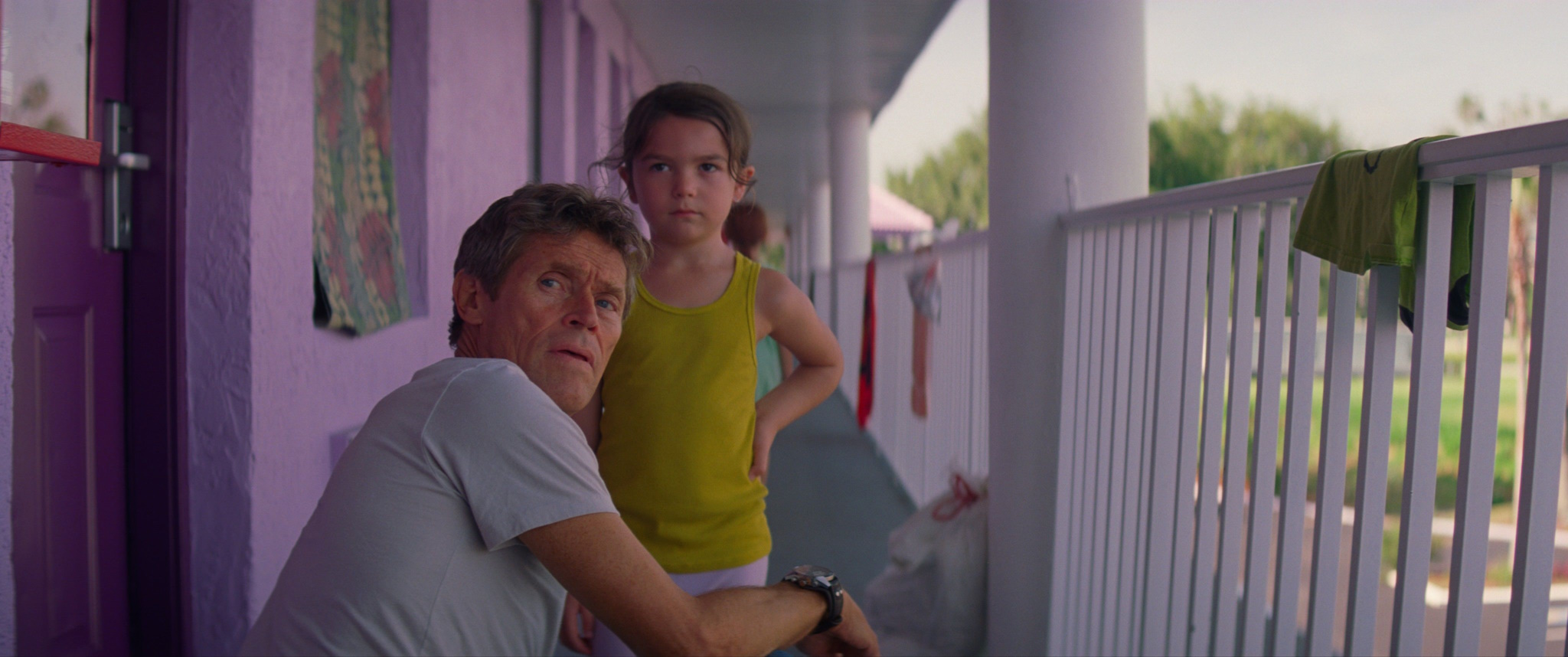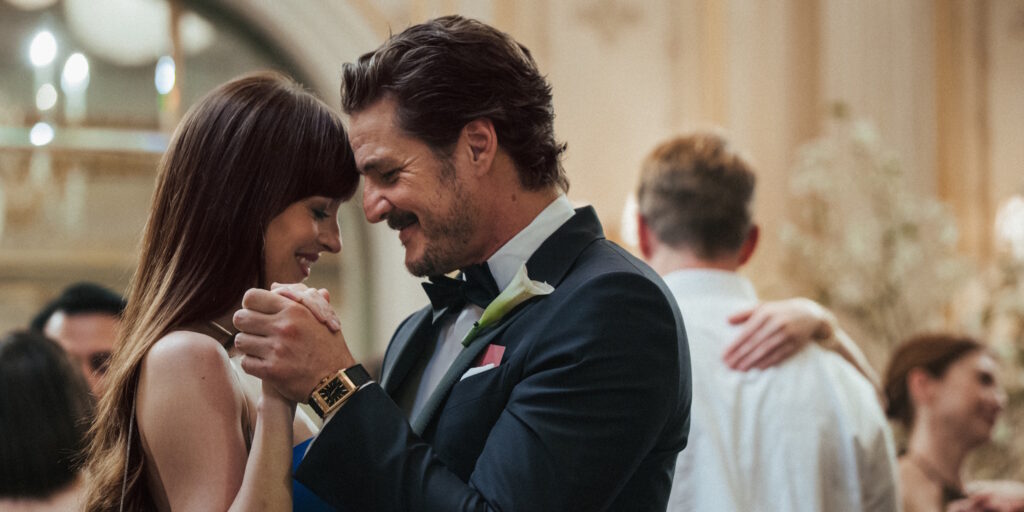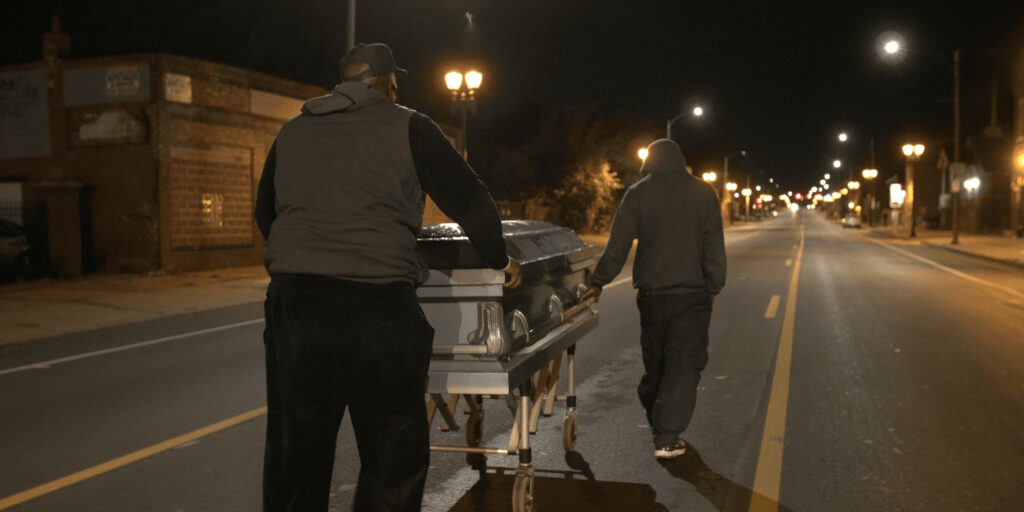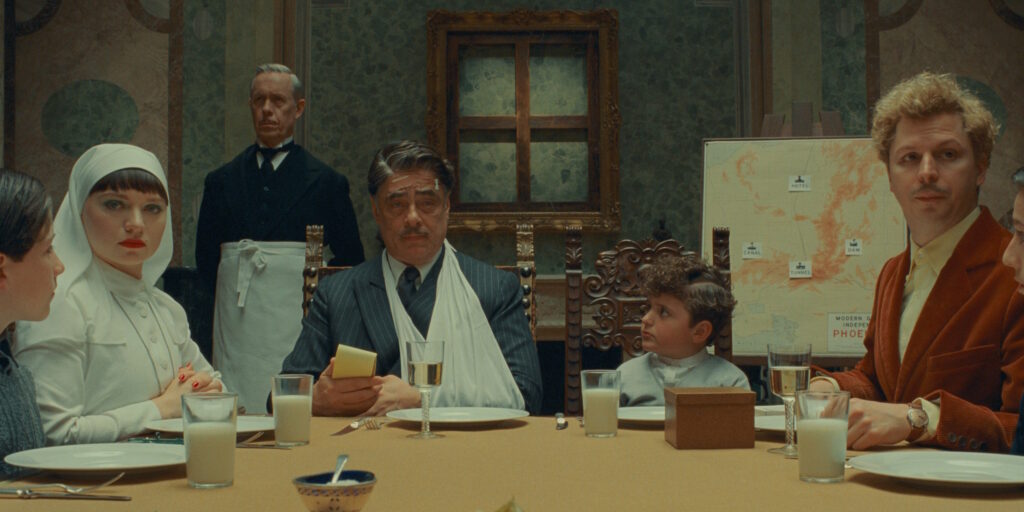[Note: This review was originally published at Cinema St. Louis’ The Lens.]
Tom Petty and the Heartbreakers’ 1976 single “American Girl” references the heartache and recklessness of young adulthood, but the song could easily describe the life of Moonee, the precocious 6-year-old heroine of The Florida Project. Petty might have been singing about unrequited love, but “something that’s so close is still so far out reach,” describes the living situation of Moonee (one-in-a-million newcomer Brooklynn Prince) and her mother Halley (Bria Vinaite) at the Magic Castle Motel. Situated on a shabby commercial strip just outside of Walt Disney World, the motel limps along on a mixture of impoverished long-term residents and hoodwinked tourists, the latter having mistaken the Castle for an official Mickey-approved establishment. The metaphor is a brassy one — a flophouse of broken dreams squatting in the literal shadow of Disney World — but The Florida Project works so well because director Sean Baker (Tangerine) leaves the Magic Castle’s pendulous symbolism well enough alone, focusing instead on an intricate, sensitive depiction of life on society’s margins.
The Castle is certainly a vivid backdrop for such portraiture. Recently painted in startling shades of wisteria and violet, the motel is a setting seemingly plucked from one of Carl Hiaasan’s farcical Florida crime novels and then wrung of its zaniness. Baker’s vision of the Sunshine State is more attuned than Hiaasan’s to the warmth and heartbreak beneath the kitsch, and more committed to the realistic portrayal of a vagabond-ish strain of American poverty. The Castle is home to a handful of colorful characters, such as topless sunbathing senior Gloria (Sandy Kane), but most of its residents appear to be rootless, riven families: single mothers, step-parents, grandparents, cousins, and various second-hand caregivers, all of them trailing restless children. Theirs is a world of hot plate meals, broken washing machines, and fevered, small-time hustles that will (hopefully) cover the week’s rent. It’s better than living on the streets, but still a perilously unstable existence, one exacerbated by the unavoidable sight of well-heeled tourists on their way to the Happiest Place on Earth.
Fortunately, the sassy, mischievous Moonee is largely untouched by the anxiety and bitterness that looms over the Magic Castle’s adult tenants. The story of The Florida Project is not told exclusively
from the girl’s viewpoint, but her unabashed gleefulness is the film’s Pole Star, the glimmering landmark that Baker steadily maintains in sight. The Castle and the surrounding strip of tacky gift shops, fast food joints, and other run-down motels aren’t merely a temporary home to Moonee. They are also an endless source of adventure and delight. Other children might grumble at the prospect of peddling knock-off perfume to tourists, or fetching stolen take-out from the waffle shack for dinner. Not Moonee, who embraces such tasks with the same enthusiasm she exhibits when manically dancing to hip hop, pouting for bikini selfies with her mom, or cheerfully bossing around her peers.
Admittedly, the girl’s endless shenanigans at times veer into troubling behavior, including spitting on cars, starting fires, and shutting off the motel’s electricity. To Moonee, however, it’s all just good summer fun. She might be an incorrigible trouble-maker, but she doesn’t have a malicious bone in her fidgety body. Indeed, the car-spitting victim eventually comes to enjoy the girl’s bubbly company, and Moonee swiftly claims the woman’s granddaughter, Jancey (Valeria Cotto) as her new best friend. Not that Jancey has much say in the matter; Moonee is accustomed to getting her way
by steamrolling everyone with her delirious energy.
Moonee also has a mouth on her, as they say, a trait she shares with her volatile mother. To the extent that The Florida Project has a plot beyond Moonee’s pleasantly aimless summer escapades in and around the motel, it is concerned with Halley’s endless, demoralizing efforts to scrape together rent money by any means necessary. Eventually, Halley’s desperation — and the enormous
chip she carries on her shoulder — jeopardize her and Moonee’s already-flimsy living situation, attracting the ruinous attention of the state child protection agency. Baker’s handling of this descent into familial calamity is consistently deft and believable, although he often flirts with a disagreeable strain of poor white trash miserablism. Halley is a fascinating character, but also wearying due to her mercurial behavior and her plasma-hot hostility to everyone around her. Fellow long-term Castle tenant Ashley (Mela Murder) seems to be Halley’s closest friend, but when Ashley warns her young son not to play with Moonee, an enraged Halley turns on a dime and brutally assaults the woman.
The contrast between Halley’s prickly paranoia and Moonee’s spirited openness is so sharp, Baker almost seems to be inviting uncertainty about whether they are truly mother and daughter in the biological sense. However, the film moots such suspicions through its depiction of the untrammeled joy that the pair experience in one another’s company. It’s only with Moonee that Halley’s razor-studded defenses drop, permitting a glimpse of the unconditional maternal love that swells in her heart. The little girl’s unassailably sunny demeanor seems to open the door for Halley’s six-year-old self, allowing her to savor the present moment without her usual cocktail of rage, regret, and resentment. Their mother-daughter tomfoolery isn’t exactly mature — after gleaning a few hundred bucks from a Disney ticket scam, they blow the sum on frivolous dollar store junk — but it’s preferable to the sophomoric misanthropy that Halley exhibits with everyone else.
The most conspicuous of Halley’s frenemies is the Magic Castle’s weary, weather-beaten manager Bobby (a sublime Willem Dafoe), who runs the motel with a scruffy blend of Old Testament sternness and New Testament kindness. He humorlessly enforces the Castle’s policies, harangues the neglectful residents for late rent, and struggles to keep up with maintenance problems ranging from a malfunctioning ice machine to a bedbug infestation. Bobby has a good heart, however, which invites a paternal lenience for rulebreakers and a tendency to go the extra mile for the guests. The motel is obliged to expel tenants every few weeks to prevent them from establishing permanent residency, but Bobby routinely helps Halley move her possessions to an empty room so that she can
vacate the premises for 24 hours to reset the clock. When a suspicious old man unctuously chats up a group of the motel’s children, Bobby sizes him up as a pedophile and smoothly strong-arms the creep off the property. Moonee is consistently a thorn in the manager’s side, but beneath Bobby’s glower at the sight of melted ice cream on his lobby floor, one can discern his deep affection for the girl.
Moonee is the film’s spiritual center, but The Florida Project ‘s three protagonists each of bring a different tone to the story. Moonee’s adventures are infused with raw jubilance; Halley’s downward spiral is riddled with agony and loathing; and Bobby’s sad-sack labors blend melancholy with notes of human warmth. It’s no accident that these three characters embody three distinct phases of life. In some sense, The Florida Project is a multi-generational study in how people deal with failure and disappointment: the giddy obliviousness of childhood; the volcanic angst of young adulthood;
and the more thoughtful regret and acceptance that arrive later in life. The modest miracle of the film is that these three separate registers never create any sort of tonal dissonance. Baker gracefully juggles the story’s disparate temperaments, even mingling them when narratively appropriately. When Halley takes Moonee for an illicit complimentary breakfast at a swanky hotel, for example, the anxiousness engendered by the pair’s crime is soothed by Halley’s palpable adoration as she watches her daughter delightedly wolf down waffles.
Mood notwithstanding, all this flitting between the three primary characters does result in an unfortunate narrative awkwardness that Baker is never quite able to resolve. If The Florida Project has one nagging flaw, it’s that the film’s generous attentiveness to Halley and Bobby’s subplots so often feel like a sheepish effort to offset the dearth of plot in Moonee’s tale. This feels a bit like defensiveness on Baker’s part. Plenty of great films have explored the experience of childhood from a more languid, subjective stance where brisk pacing is less critical than the emotional contours of the story (The Red Balloon, The 400 Blows, The Spirit of the Beehive, George Washington). Moreover, there’s no reason that the absurd, Sisyphean upkeep of the Magic Castle (or the motel’s underbelly of festering scuzziness) can’t conveyed through the lens of Moonee’s experience. Baker’s adept handling of the multiple tones aside, it seems like a needless structural complication to frame
Halley and Bobby as de facto co-leads with a kindergartener.
Truthfully, Moonee’s sequences are sufficiently strong on their own that one is left wondering why the film doesn’t adhere exclusively to her point of view. Certainly, the formal and storytelling choices Baker makes suggest such an approach. Moonee’s scenes are generally shot close to the ground, often from a low angle, approximating the literal viewpoint of a six-year-old. Baker frequently exhibits a coyness with respect to sex and violence that suggests a child’s oblique, semi-ignorant viewpoint. It takes two or three prolonged, repeated shots of Moonee happily playing in the
tub for it to become apparent that the girl is sequestered to a bubble bath whenever her mother is servicing a john. There’s a nagging sensation that Baker knew how to make a grown-up film
from a kid’s viewpoint, but lost his nerve.
These are relatively small storytelling quibbles, however. They are definitively outshone by the film’s merits: the distilled joy that characterizes Moonee’s hijinks; the gaudy landscape of crumbling tourist eyesores; and the discerning portrayal of poverty that is just shy of homelessness. The Florida Project isn’t an overtly political film, but in the present age of class warfare and Trumpian
callousness, there’s an understated radicalism in simply showing how people manage to get by when they don’t have a working car, bank account, or permanent address. Granted, the film isn’t timid about portraying Halley as a vicious, tramp-stamped train wreck, but Baker resists the urge to gratuitously tut-tut the character. Unlike last year’s I, Daniel Blake, which rather gallingly depicted prostitution as the Worst Thing Ever, The Florida Project doesn’t excoriate Halley for turning to sex work to keep her child in food, clothes, and shelter. Rather, it indicts her for being an odious gorgon to everyone she encounters, even people who are sympatric to her tribulations.
In the end, what resonates most about The Florida Project are the details, such as the amusingly cumbersome and protracted process of moving a broken ice machine down a hallway and into an
elevator. Or the enormous plaster wizard, star-spangled and graybearded, that grins down maniacally from the roof of a nearby gift shop. Or the delirious pleasure that Moonee and Jancey glean from a loaf of broad and jar of jelly passed out by a Christian food pantry. Indeed, the most durable and compelling aspect of Baker’s feature is its portrayal of the way that children create their own happiness, constructing a fantasy kingdom from the banal features of their immediate surroundings, whatever that environment might be. For Moonee, the Magic Castle isn’t the last ditch stop on the road to foster care or outright homelessness. It’s a marvelous Adventureland, where she is at once a princess, knight, explorer, clown, and mastermind.




